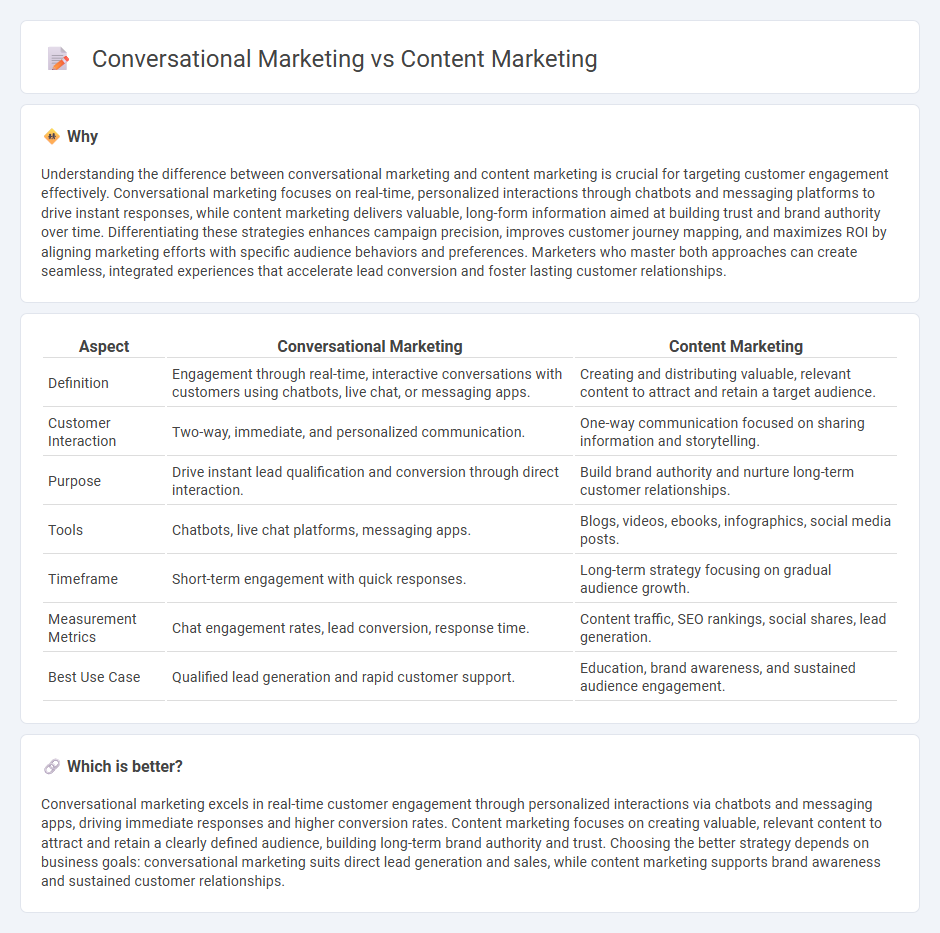
Conversational marketing leverages real-time, personalized interactions through channels like live chat and messaging apps to engage customers, fostering immediate connections and feedback. Content marketing focuses on creating valuable, educational materials such as blogs, videos, and whitepapers to attract and nurture a target audience over time. Explore how integrating both strategies can boost your marketing effectiveness.
Why it is important
Understanding the difference between conversational marketing and content marketing is crucial for targeting customer engagement effectively. Conversational marketing focuses on real-time, personalized interactions through chatbots and messaging platforms to drive instant responses, while content marketing delivers valuable, long-form information aimed at building trust and brand authority over time. Differentiating these strategies enhances campaign precision, improves customer journey mapping, and maximizes ROI by aligning marketing efforts with specific audience behaviors and preferences. Marketers who master both approaches can create seamless, integrated experiences that accelerate lead conversion and foster lasting customer relationships.
Comparison Table
| Aspect | Conversational Marketing | Content Marketing |
|---|---|---|
| Definition | Engagement through real-time, interactive conversations with customers using chatbots, live chat, or messaging apps. | Creating and distributing valuable, relevant content to attract and retain a target audience. |
| Customer Interaction | Two-way, immediate, and personalized communication. | One-way communication focused on sharing information and storytelling. |
| Purpose | Drive instant lead qualification and conversion through direct interaction. | Build brand authority and nurture long-term customer relationships. |
| Tools | Chatbots, live chat platforms, messaging apps. | Blogs, videos, ebooks, infographics, social media posts. |
| Timeframe | Short-term engagement with quick responses. | Long-term strategy focusing on gradual audience growth. |
| Measurement Metrics | Chat engagement rates, lead conversion, response time. | Content traffic, SEO rankings, social shares, lead generation. |
| Best Use Case | Qualified lead generation and rapid customer support. | Education, brand awareness, and sustained audience engagement. |
Which is better?
Conversational marketing excels in real-time customer engagement through personalized interactions via chatbots and messaging apps, driving immediate responses and higher conversion rates. Content marketing focuses on creating valuable, relevant content to attract and retain a clearly defined audience, building long-term brand authority and trust. Choosing the better strategy depends on business goals: conversational marketing suits direct lead generation and sales, while content marketing supports brand awareness and sustained customer relationships.
Connection
Conversational marketing leverages real-time, personalized interactions to engage prospects, while content marketing provides valuable information and resources that attract and educate the audience. Together, they create a cohesive customer journey where content nurtures leads and conversational marketing converts them through direct dialogue. This integration enhances customer experience and drives higher conversion rates by aligning informative content with interactive communication.
Key Terms
Content creation vs. Real-time interaction
Content marketing emphasizes strategic content creation such as blogs, videos, and infographics designed to attract and engage target audiences over time. Conversational marketing prioritizes real-time interaction through chatbots, live chat, and messaging platforms to provide immediate responses and personalized experiences. Explore the benefits and best practices of each approach to optimize your marketing strategy.
Audience engagement vs. Two-way communication
Content marketing emphasizes creating valuable, relevant content tailored to audience interests to boost engagement and brand loyalty. Conversational marketing centers on real-time, two-way communication through chatbots or live messaging, enabling personalized interactions that enhance customer experience. Discover how mastering both strategies can transform your marketing approach.
Educational value vs. Personalization
Content marketing emphasizes delivering educational value through informative articles, videos, and resources that build trust and authority with the audience. Conversational marketing prioritizes personalization by engaging customers in real-time interactions via chatbots, messaging apps, or live chat to address individual needs and accelerate decision-making. Explore the unique benefits and strategies of both approaches to optimize your marketing efforts effectively.
Source and External Links
What is Content Marketing? A Beginners Guide - Content marketing is the strategic creation and distribution of valuable, relevant content designed to attract and engage your target audience, focusing on building trust and driving profitable customer actions rather than direct advertising.
The Complete Content Marketing Guide For 2025 - Copyblogger - Content marketing is a form of inbound marketing that builds relationships and trust with customers through useful or entertaining content, helping to reduce customer acquisition costs and generate compounding returns over time.
What Is Content Marketing? - Content marketing is a strategic marketing approach that creates and distributes valuable, relevant, and consistent content to attract and retain a clearly defined audience and ultimately drive profitable customer action without directly pitching products.
 dowidth.com
dowidth.com